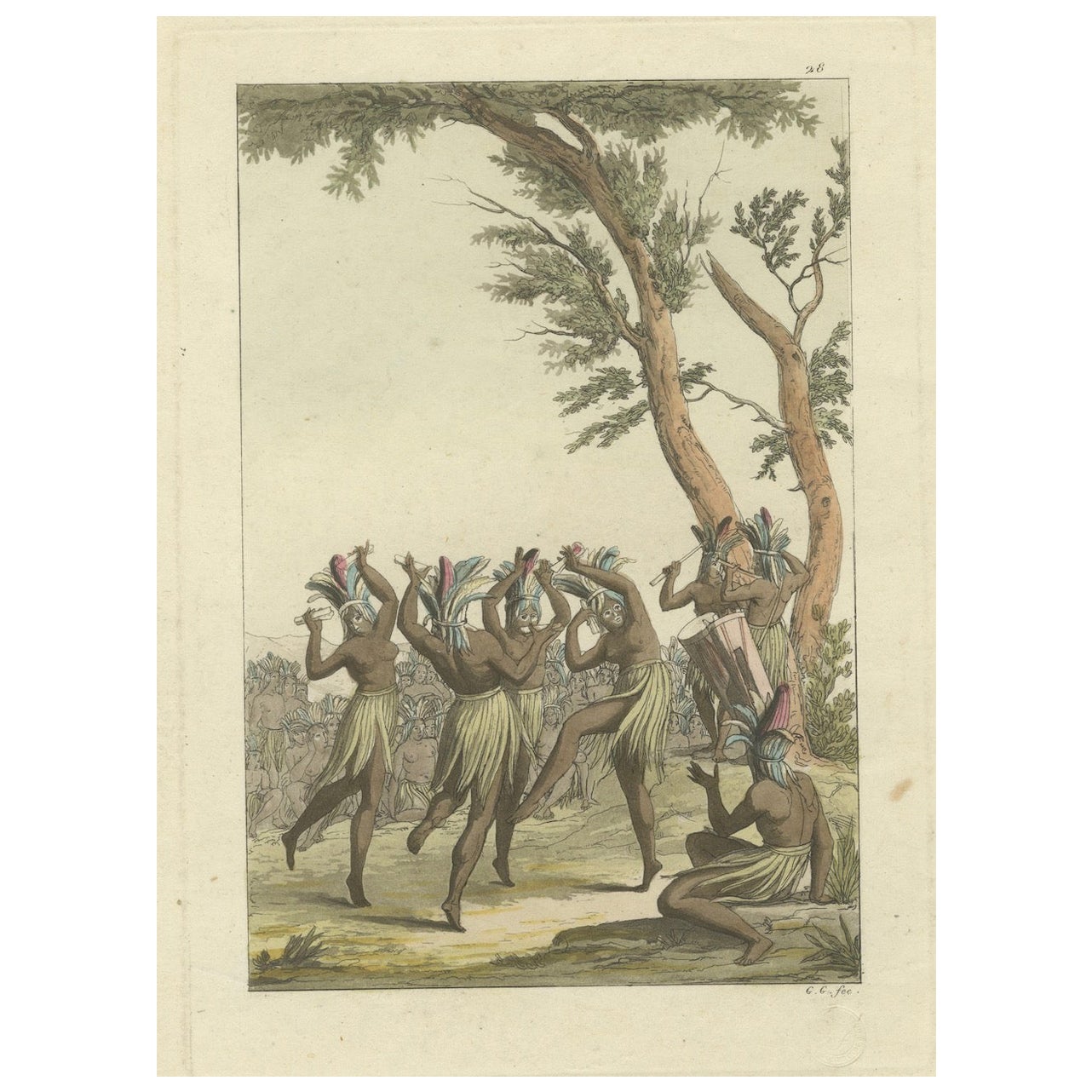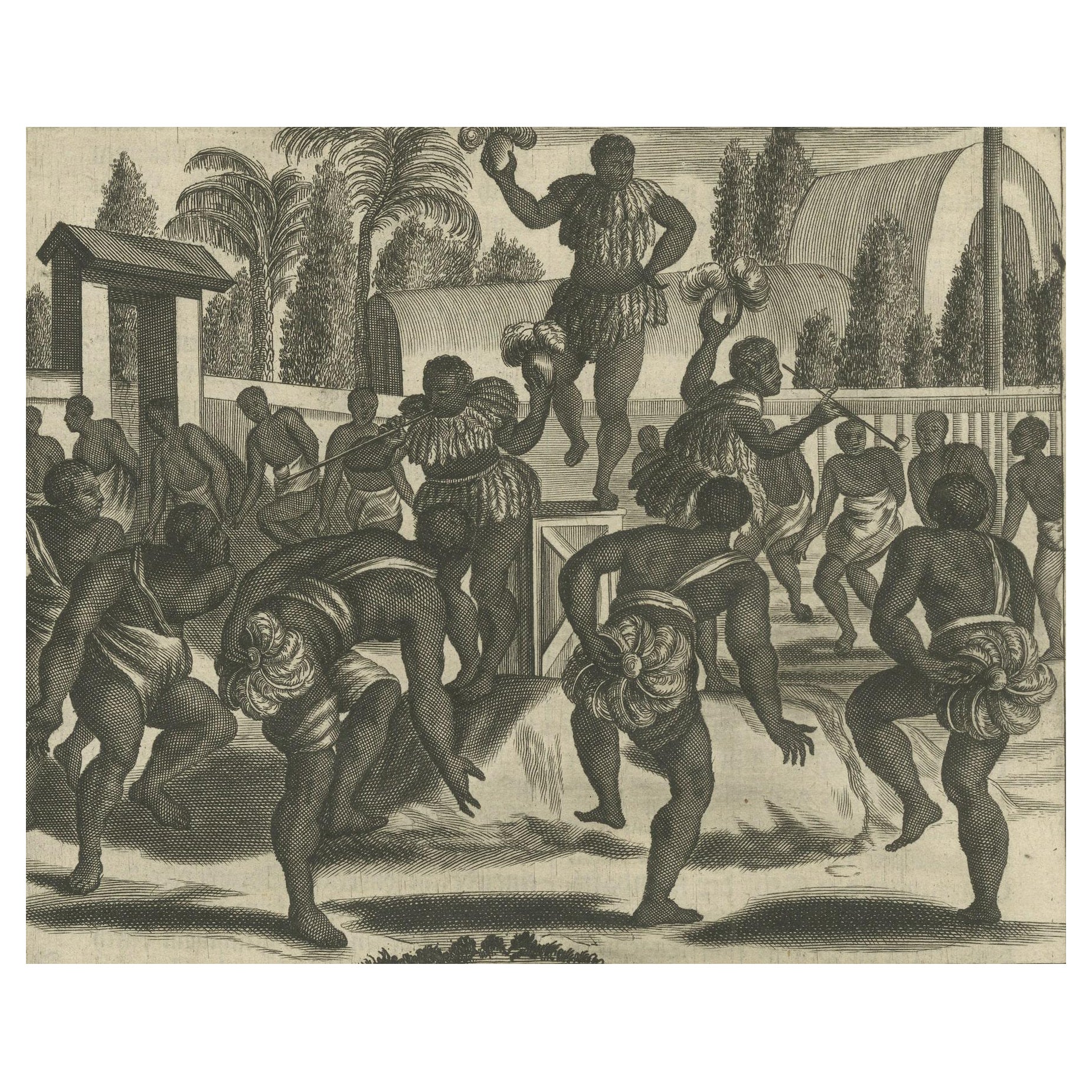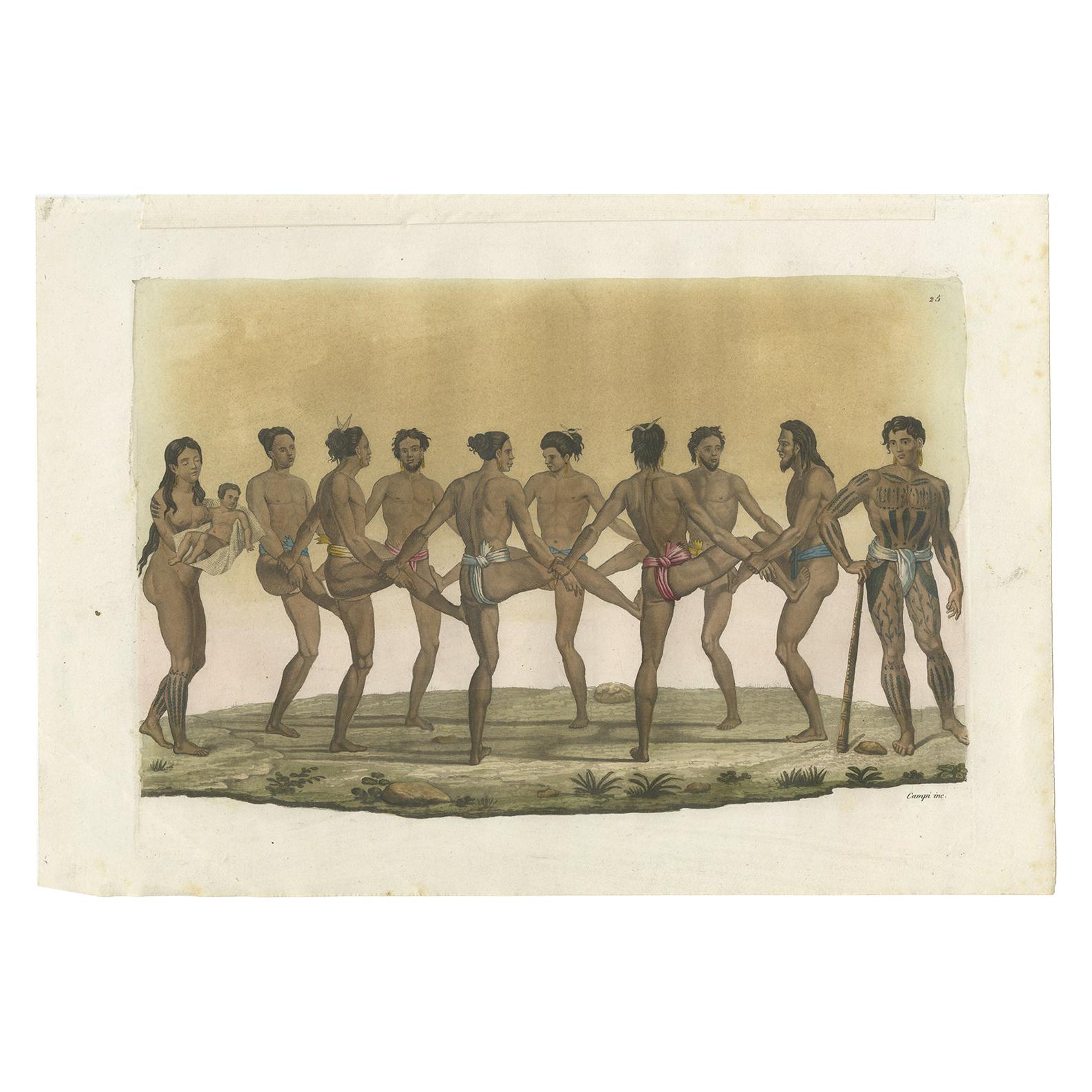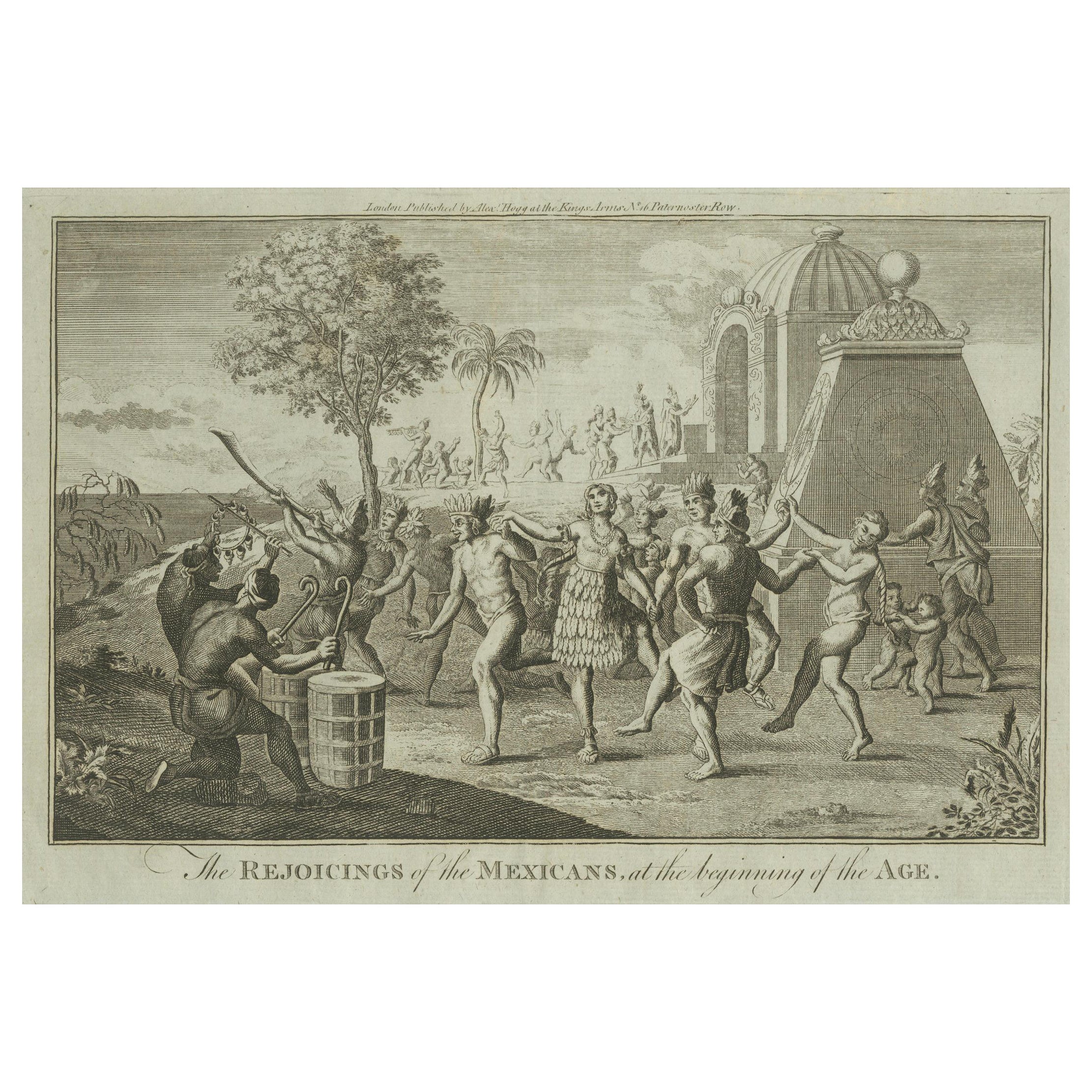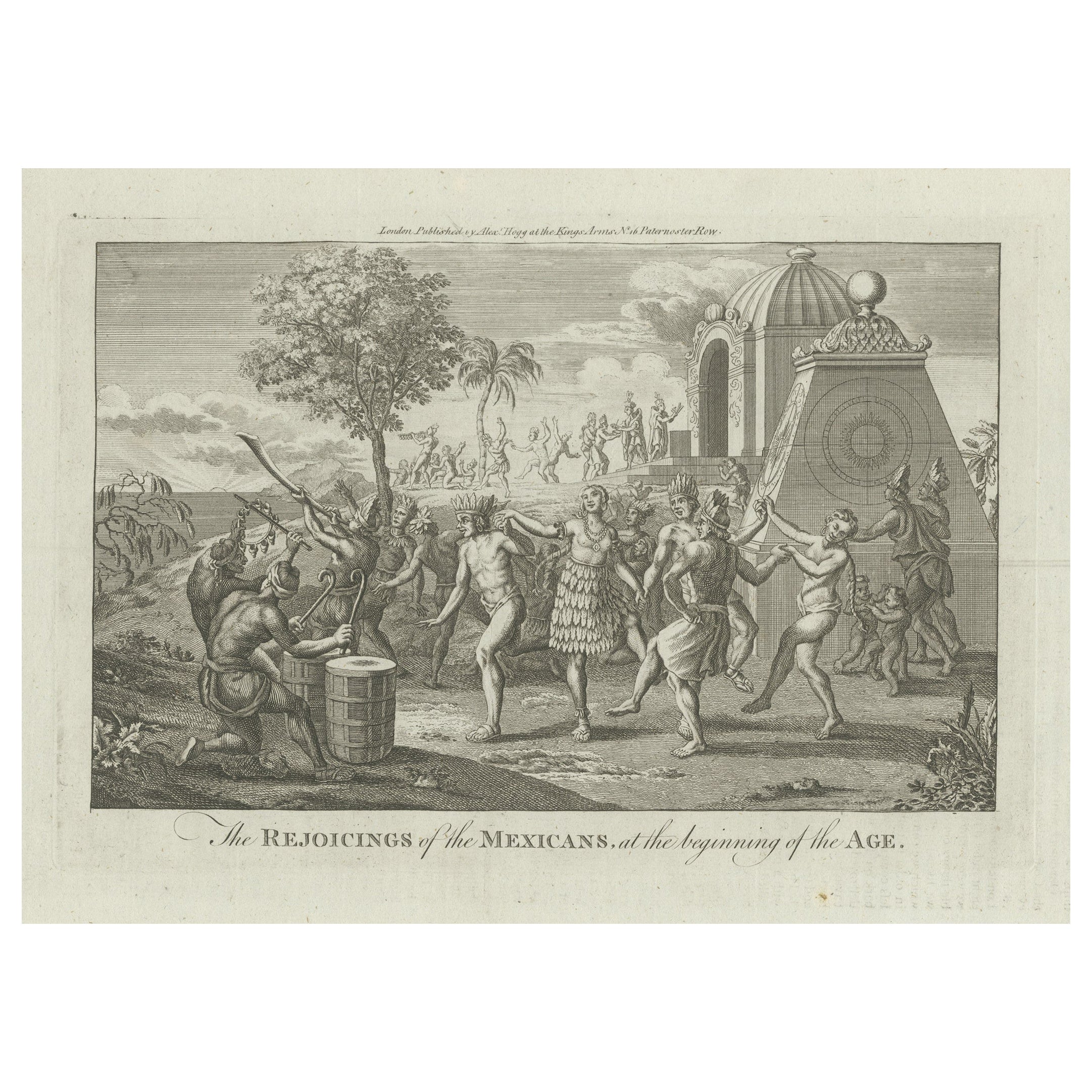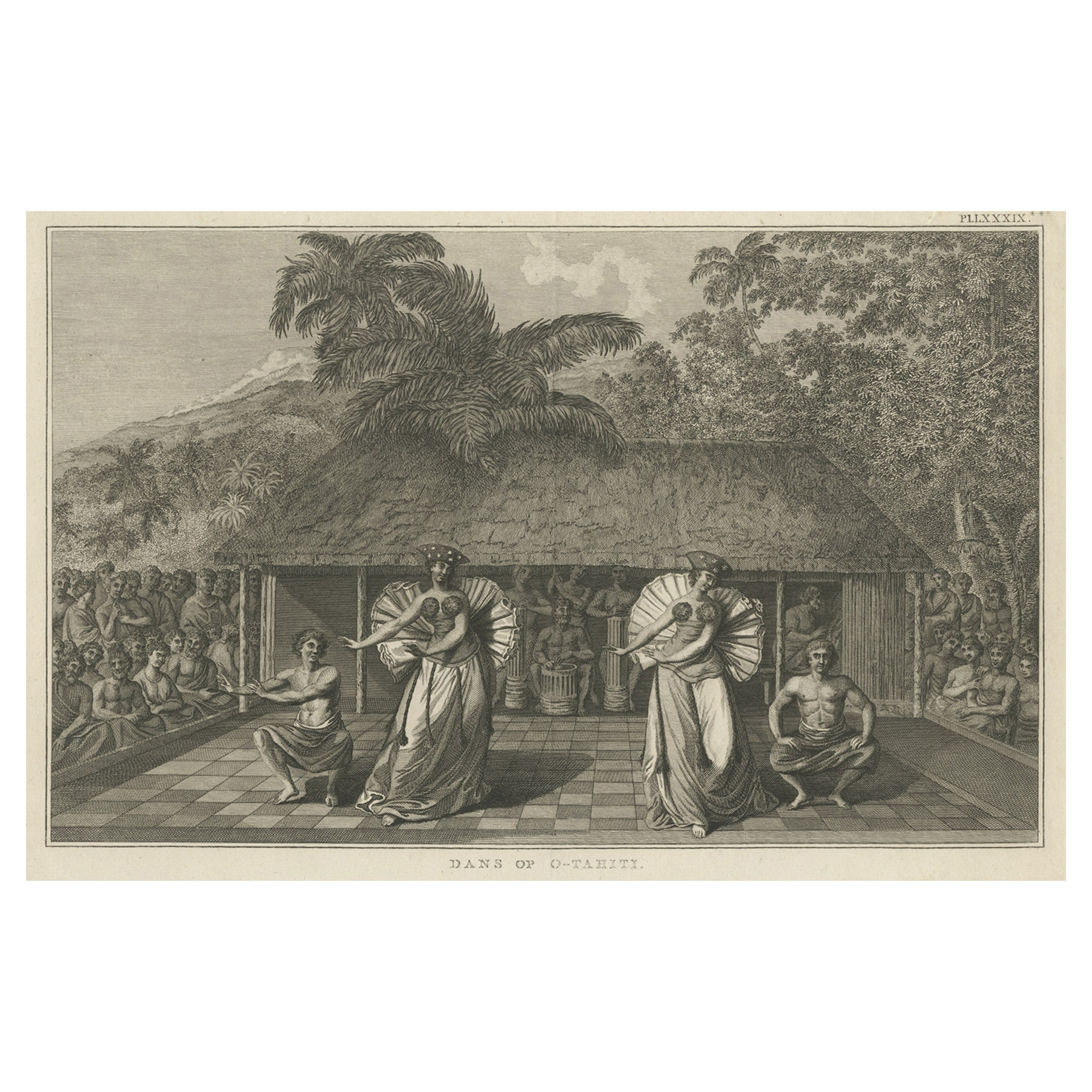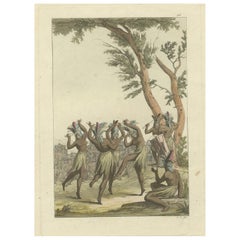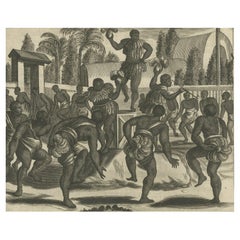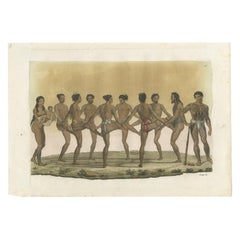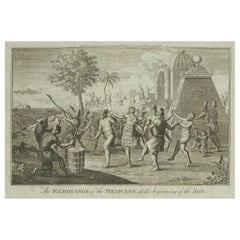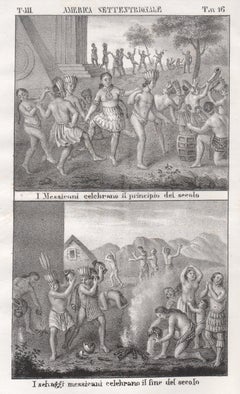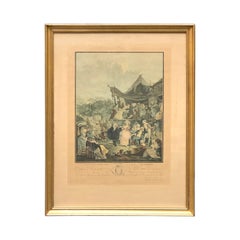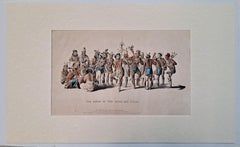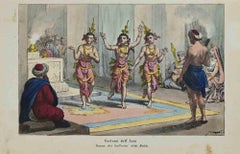Items Similar to Engraving of Traditional Chilean Circle Dance: A Festive Gathering in 1827 Chile
Want more images or videos?
Request additional images or videos from the seller
1 of 6
Engraving of Traditional Chilean Circle Dance: A Festive Gathering in 1827 Chile
$373.82
$467.2820% Off
£278.23
£347.7920% Off
€312
€39020% Off
CA$512.04
CA$640.0520% Off
A$569.50
A$711.8820% Off
CHF 297.38
CHF 371.7220% Off
MX$6,930.23
MX$8,662.7820% Off
NOK 3,797.94
NOK 4,747.4320% Off
SEK 3,561.80
SEK 4,452.2520% Off
DKK 2,375.15
DKK 2,968.9320% Off
Shipping
Retrieving quote...The 1stDibs Promise:
Authenticity Guarantee,
Money-Back Guarantee,
24-Hour Cancellation
About the Item
Antique print titled "Danze de' Chiliesi" (Dance of the Chileans), from the historical work "Il Costume Antico e Moderno" by Giulio Ferrario. The print, created in 1821, showcases a traditional Chilean dance, vividly captured in line and aquatint etching with original hand coloring on wove (vellin) paper.
The scene depicts a group of Chilean dancers in a circular formation, engaging in a traditional dance. The dancers are adorned in colorful attire, featuring breechcloths, leggings, and vibrant headdresses with feathers, which reflect their cultural heritage and the festive nature of the dance. The setting is outdoors, possibly during a community celebration or ritual, indicated by the natural backdrop and the casual yet organized arrangement of the figures.
Cultural and Historical Significance
This print is significant as it provides a visual documentation of Chilean cultural practices from the early 19th century, emphasizing the traditional dances that were an integral part of community gatherings and celebrations. The artwork, by C. Bramati and Paolo Fumagalli after designs by Giulio Ferrario, is part of a larger series that aimed to capture the costumes and customs of people around the world, offering insights into the diversity of cultural expressions during a time of burgeoning global awareness.
The detailed depiction not only highlights the dance but also serves as an ethnographic record, preserving aspects of Chilean culture that might have evolved or faded over time. This work, along with others in the series, was widely distributed and appreciated for its educational and artistic value, making significant contributions to the understanding of global cultural heritage in the 19th century.
‘Tavole XXVIII. Danze de’ Chiliesi.’
Line & aquatint etching with original hand colouring on wove (vellin) paper.
Sheet size: 33 x 23,5 cm. (13 x 9,3 inch). Image size: 21 x 15,5 cm. (8,3 x 6,1 inch).
In more detail:
From: ‘Il Costume Antico e Moderno …, l’America.’ , by Giulio Ferrario, published in Milan in 17 volumes (first issue), published sequentially between c. 1815/1816 until 1826 after first being issued in 143 weekly installments. This Italian volume has the date 1821. The second issue was published in 21 volumes in 1827. The work appeared in Italian and French. Smaller size editions with smaller much less elaborate plates were published in Florence (1823-38), Naples (1831-42) and even a 16mo. editon in Livorno (1830). Original blindstamp at bottom right image. The sources used for this work are wide including van Humboldt, von Wied etc.
Made by ‘C. Bramati and Paola Fumagalli’ after ‘Giulio Ferrario’. Giulio Ferrario was founder of the ‘Societa Tipografica de Classici Italiani’ and served as the director of the Braidense National Library in Milan, Italy. Artists that worked on this monumental work are: Gallo Gallina, D.K. Bonatti, A. Biasioli, L. Rossi, Paolo Fumagalli, Gaetano Zancon (1771-1816), G. Bigatti, C. Bramati, G. Gallo, C. Bottiglia, G. Castellini, Antonio Rancati (1784-1816), Vittorio Raineri, Sydney Parkinson, Castelli, A. Sanquirico (1777-1849), Angelo Monticelli (1778-1837), A.L. Rossins, Bottigella and others.
1. Traditional Chilean dance
2. Cultural heritage
3. 19th-century ethnography
4. Giulio Ferrario
5. "Il Costume Antico e Moderno"
6. Antique print
7. Circle dance
8. Community celebration
9. Chilean costume
10. Historical illustration
- Dimensions:Height: 9.06 in (23 cm)Width: 13.39 in (34 cm)Depth: 0 in (0.02 mm)
- Materials and Techniques:
- Period:
- Date of Manufacture:circa 1827
- Condition:Condition: Very good, given age. General age-related toning and/or occasional minor defects from handling. Please study scan carefully.
- Seller Location:Langweer, NL
- Reference Number:Seller: BG-13806-791stDibs: LU3054341208852
About the Seller
5.0
Recognized Seller
These prestigious sellers are industry leaders and represent the highest echelon for item quality and design.
Platinum Seller
Premium sellers with a 4.7+ rating and 24-hour response times
Established in 2009
1stDibs seller since 2017
2,508 sales on 1stDibs
Typical response time: <1 hour
- ShippingRetrieving quote...Shipping from: Langweer, Netherlands
- Return Policy
Authenticity Guarantee
In the unlikely event there’s an issue with an item’s authenticity, contact us within 1 year for a full refund. DetailsMoney-Back Guarantee
If your item is not as described, is damaged in transit, or does not arrive, contact us within 7 days for a full refund. Details24-Hour Cancellation
You have a 24-hour grace period in which to reconsider your purchase, with no questions asked.Vetted Professional Sellers
Our world-class sellers must adhere to strict standards for service and quality, maintaining the integrity of our listings.Price-Match Guarantee
If you find that a seller listed the same item for a lower price elsewhere, we’ll match it.Trusted Global Delivery
Our best-in-class carrier network provides specialized shipping options worldwide, including custom delivery.More From This Seller
View AllRitual Dance: Expressions of Cultural Heritage in an African Ceremony, 1827
Located in Langweer, NL
The print is from "Il Costume Antico e Moderno" by Giulio Ferrario, specifically depicting the "Le Lullunge" feast in Senegambia. This festival is illustrated as part of the extensive series detailing the customs, costumes, and daily life of people from different parts of the world. The illustration captures a lively and culturally significant dance that forms part of the "Le Lullunge" celebrations, showcasing traditional attire and communal participation, which are central to the event in Senegambian culture. The illustration not only serves as a vibrant representation of the dance and celebration but also as an ethnographic record from the early 19th century, emphasizing the richness of Senegambian traditions.
The term "Senegambia" historically referred to a region in West Africa that encompassed parts of what are today known as Senegal and The Gambia. This area is known for its rich cultural heritage, including vibrant festivals and communal celebrations like the one depicted in the illustration. The "Le Lullunge" feast, as illustrated in Giulio Ferrario's "Il Costume Antico e Moderno," captures the traditional dances and social practices of the peoples in this West African region.
This original antique hand-colored print depicts a vibrant scene of Native African dance, possibly part of a ceremonial or ritualistic activity. The individuals are animatedly engaged in dance, with their limbs dynamically positioned, suggesting vigorous movement. Each figure is adorned with elaborate feathered headdresses and carries feathers or other items as part of their dance. These accessories likely have cultural significance, possibly denoting status, role in the ceremony, or spiritual symbolism.
The attire of the dancers is simple yet functional for their vigorous activity, consisting of skirts that allow for ease of movement. Their outfits are decorated with additional elements that may indicate tribal affiliation or personal achievement. The dancers are barefoot, connecting them physically and symbolically to the earth, which is a common aspect in many African cultural practices emphasizing a connection to nature.
The setting of the dance is outdoors, under a large tree, indicating the importance of natural surroundings for the event. This could be a communal gathering place, chosen for its significance within their community or for its natural beauty and tranquility.
Overall, this image captures a moment of cultural expression, highlighting the importance of dance in Native African traditions as a form of communication, celebration, or spiritual practice. The detail and color used in the depiction aim to convey the vibrancy and energy of the scene, reflecting the artist’s perspective on these cultural practices.
In more detail:
From: ‘Il Costume Antico e Moderno …, l’America.’ , by Giulio Ferrario, published in Milan in 21 volumes by Antonio Fortunato Stella in 1827 (first edition, second issue). The 17 volumes of the first issue were published sequentially between c. 1815/1816 until 1826 after first being issued in 143 weekly installments. The work appeared in Italian and French. Smaller size editions with smaller much less elaborate plates were published in Florence (1823-38), Naples (1831-42) and even a 16mo. editon in Livorno (1830). Original blindstamp at bottom right image. The sources used for this work are wide.
Made by ‘Gallo Gallina’ after ‘Giulio Ferrario’. Giulio Ferrario was founder of the ‘Societa Tipografica de Classici Italiani’ and served as the director of the Braidense National Library in Milan, Italy. Artists that worked on this monumental work are: Gallo Gallina, D.K. Bonatti, A. Biasioli, L. Rossi, Paolo Fumagalli, Gaetano Zancon (1771-1816), G. Bigatti, C. Bramati, G. Gallo, C. Bottiglia, G. Castellini, Antonio Rancati (1784-1816), Vittorio Raineri, Sydney Parkinson...
Category
Antique 1820s Prints
Materials
Paper
$239 Sale Price
20% Off
Ritual Dance in Brazil in the 17th Century on a Copper Engraving by Montanus
Located in Langweer, NL
Title: "Ritual Dance in Brazil"
Description: This original copper engraving from Arnoldus Montanus' "Die Unbekannte Neue Welt oder Beschreibung des Welt-teils Amerika und des Sud-La...
Category
Antique 1670s Prints
Materials
Paper
$404 Sale Price
24% Off
Antique Print of Dancing Inhabitants of the Caroline Islands by Ferrario '1831'
Located in Langweer, NL
Original antique print of dancing inhabitants of the Caroline Islands. This print originates from 'Costume Antico e Moderno: Palestine, China, India, ...
Category
Antique Mid-19th Century Prints
Materials
Paper
$239 Sale Price
20% Off
Old Engraving of Mexican Festivities and Rituals in the Age of Discovery, 1794
Located in Langweer, NL
The engraving provided is titled "The Rejoicings of the Mexicans, at the beginning of the Age." It was included in Portlock’s "New Collection of Voyages and Travels," published in 17...
Category
Antique Late 18th Century Prints
Materials
Paper
$172 Sale Price
20% Off
Free Shipping
Celebration and Ritual: Engraving of Mexican Festivities in the Age of Discovery
Located in Langweer, NL
The engraving provided is titled "The Rejoicings of the Mexicans, at the beginning of the Age." It was included in Portlock’s "New Collection of Voyages and Travels," published in 17...
Category
Antique Late 18th Century Prints
Materials
Paper
$388 Sale Price
40% Off
Free Shipping
Antique Copper Plate Engraving Depicting Natives of Tahiti Dancing, 1803
Located in Langweer, NL
Antique print titled 'Dans van O-Tahiti'.
Antique print depicting natives of Tahiti, dancing. Originates from 'Reizen Rondom de Waereld door James Cook (..)'.
Artists and Eng...
Category
Antique Early 1800s Prints
Materials
Paper
$335 Sale Price
20% Off
You May Also Like
Indigenous Peoples celebrating, Mexico, America, mid 19th century lithograph.
Located in Melbourne, Victoria
'I Messicani celebrano il principio del secolo' / 'I selvaggi messicani celebrano il fine del secolo'
Italian lithograph, c1841. Originally from 'Galleria universale di tutti i popo...
Category
Mid-19th Century Naturalistic Figurative Prints
Materials
Lithograph
19th Century French Engraving of a Wedding Dance
Located in Sofia, BG
Fine colourful engraving presenting a wedding dance and all the guests around.
France, circa 1890.
Category
Antique Late 19th Century French Drawings
Materials
Paper
War Dance of the Sauks and Foxes Hand Colored Lithograph C.1837
Located in San Francisco, CA
War Dance Of The Sauks And Foxes Hand Colored Lithograph c.1837
Published by E.C. Biddle, Philadelphia.
Beautiful hand colored lithograph from the "History of the Indian Tribes of ...
Category
1830s Naturalistic Figurative Prints
Materials
Lithograph
Balok Dancers - Lithograph - 1862
Located in Roma, IT
Customs -Balok Dancers is a Hand-colored lithograph on paper realized in 1862.
Titled on the lower.
The artwork belongs to the Suite Uses and customs of all the peoples of the univ...
Category
1860s Modern Figurative Prints
Materials
Lithograph
Indien Dansant - Lithograph by Auguste Wahlen - 1844
Located in Roma, IT
Indien Dansant is a hand colored lithographs realized by Auguste Wahlen in 1844.
Good conditions.
The artwork belongsto the Suite Moeurs, usages et costumes de tous les peuples du ...
Category
1840s Modern Figurative Prints
Materials
Lithograph
Pueblo Harvest Dance, vintage Painting by Jose Roybal (San Ildefonso Pueblo)
By Jose Roybal
Located in Denver, CO
An original watercolor painting by San Ildefonso (Pueblo) Native American artist, Jose Roybal (1922-1978) depicting the Pueblo Harvest Dance. Presented in ...
Category
Vintage 1970s American Native American Paintings
Materials
Paper
$2,600 Sale Price
60% Off
More Ways To Browse
G Rossi
Antique Metal Coffee Pot
Antique Piano Box
Antique Porcelain Trinket Boxes
Antique Pottery Cats
Antique Rattles
Antique Rice Box
Antique Shagreen Box
Antique Shell Vanity
Antique Window Shutters
Antique Wrought Iron Brackets
Art Deco Skyscraper Shade
Art Deco Uranium Glass
Art Nouveau Tea Pot
Asian Style Furniture Burl
Atelier Hugo
Baby Rattle
Benin Bronze
